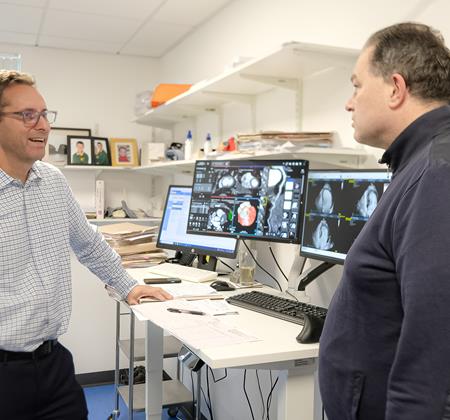
Services

Advanced cardiac monitoring with Zio iRhythm
Some people may experience an irregular heart rhythm, otherwise known as arrhythmia. This is when your heart beats too slow, too fast or with an irregular rhythm when resting and not during physical activity.
Left untreated, arrhythmia can be life-threatening. Fortunately, it is a treatable condition. It is usually diagnosed with Electrocardiogram (ECG) monitoring, but now it can now also be diagnosed by our consultant cardiologist using Zio, a new continuous monitoring system which is used to detect and diagnose many kinds of irregular heart rhythms.
How does Zio work?
The Zio monitor is a small, discreet and comfortable patch that can be worn during normal day-to-day activities including sleep, shower and exercise. It works by recording every single heartbeat and patients can either log their symptoms on a log booklet or in a mobile app. The data is then analysed and generates a report to allow your cardiologist to make a formal diagnosis and offer the right treatment.
What are the benefits compared to standard ambulatory ECG (Holter) monitoring?
Standard monitoring cannot be worn during showering and is difficult to wear when exercising as the external cables and the ECG attachment stickers tend to fall off if you sweat heavily. The standard ECG stickers also often cause skin irritation with extended use, and you can accidentally detach the ECG cables when you're asleep. Due to these reasons patients find it difficult to tolerate wearing the standard ECG monitor for more than three days. As the Zio patch is worn over two weeks it has greater power to detect intermittent heart rhythm disorders.
How long will I need to wear the device for?
The patch will be fitted during your consultation and you will need to wear it for two weeks. You then just post it in the box supplied to iRhythm in the UK so their team can analyse your data.
When will I get my results?
The report is completed within 48 hours of receiving your monitor. Within 20 days of fitting the patch you will have an appointment with our consultant cardiologist to discuss your results and treatment plan, and any potential further investigations you may need.
Can I refer myself?
Yes, you do not need to be referred by another healthcare professional.
What is the cost of the monitor?
This service costs £695 and is not covered by the States contract, so either you or your health insurer will need to pay. Always check first with your health insurer whether your policy covers this treatment and obtain a pre-authorisation code.
*Prices correct as at 26 April 2024.
Get in touch now to find out more or to book your assessment today
